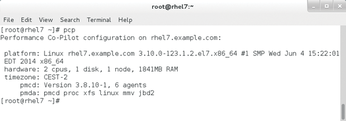Red Hat Enterprise Linux 7 tested
More Entropy
Red Hat has also tackled an annoying problem with which many virtualization admins are familiar: lack of entropy in virtual machines. KVM gives you the option of passing any random number generator (RNG) on the host through to your VMs in the future. This means that the VMs have access to the same source of entropy as the host system.
Speaking of interoperability, Red Hat explicitly points out that the new RHEL version offers the possibility of joining an existing Active Directory infrastructure out the box. If you have an account in an Active Directory environment, you can log into Linux hosts in this kind of setup, depending on the assigned permissions.
The intent here is for the RHEL 7 system to integrate with existing Windows environments in a much better way, thus reducing migration overhead. This feature can be especially handy where consolidated setups achieve a high degree of heterogeneity in cloud computing. If you run a mix of many Windows and Linux hosts, you will appreciate this bridge between the operating system worlds.
Storage
The innovations that Red Hat 7 has implemented in terms of storage for RHEL are also likely to be interesting for virtual environments. For example, a host with the new version of the operating system can leverage new targets for iSCSI and Fibre Channel over Ethernet (FCoE) to export devices for both protocols; the implementation in RHEL 6 was far slower compared with the new version, says Red Hat. Whether or not the new driver in RHEL really pays dividends remains to be seen. Given that a current RHEL is always the basis for many other products from Raleigh – including the Red Hat Storage Server – it must at least be assumed that Red Hat has invested much time in this feature.
System Administration and Performance
Several delicacies await system administrators looking for ways to facilitate their work. One component contributing to this is the Performance Co-Pilot (Figure 5). This framework logs and monitors various values that are relevant to the performance of the system, which will help admins see more quickly whether changes affect the performance of the system. A graphical tool gives you access to all the relevant data and helps you search for troublemakers. If you have ever spent hours investigating a system to discover the cause of its poor performance, you will be very happy with this component.

Additionally, several tools help improve system performance, including Tuna. Tuna lets you edit various performance-related kernel parameters and even supports profiling of various services. In combination with tuned, this provides an overall picture. Tuned can automatically set certain system parameters with the preconfigured profiles supplied with RHEL 7.
By default, parameters are preset on the basis of the RHEL product variant the customer uses. Thus, a storage server will use a different profile than a node that takes care of virtual machines. Some basic tuning is already enabled in RHEL 7 out of the box; admins can take care of the details.
Buy this article as PDF
(incl. VAT)
Buy Linux Magazine
Subscribe to our Linux Newsletters
Find Linux and Open Source Jobs
Subscribe to our ADMIN Newsletters
Support Our Work
Linux Magazine content is made possible with support from readers like you. Please consider contributing when you’ve found an article to be beneficial.

News
-
NVIDIA Released Driver for Upcoming NVIDIA 560 GPU for Linux
Not only has NVIDIA released the driver for its upcoming CPU series, it's the first release that defaults to using open-source GPU kernel modules.
-
OpenMandriva Lx 24.07 Released
If you’re into rolling release Linux distributions, OpenMandriva ROME has a new snapshot with a new kernel.
-
Kernel 6.10 Available for General Usage
Linus Torvalds has released the 6.10 kernel and it includes significant performance increases for Intel Core hybrid systems and more.
-
TUXEDO Computers Releases InfinityBook Pro 14 Gen9 Laptop
Sporting either AMD or Intel CPUs, the TUXEDO InfinityBook Pro 14 is an extremely compact, lightweight, sturdy powerhouse.
-
Google Extends Support for Linux Kernels Used for Android
Because the LTS Linux kernel releases are so important to Android, Google has decided to extend the support period beyond that offered by the kernel development team.
-
Linux Mint 22 Stable Delayed
If you're anxious about getting your hands on the stable release of Linux Mint 22, it looks as if you're going to have to wait a bit longer.
-
Nitrux 3.5.1 Available for Install
The latest version of the immutable, systemd-free distribution includes an updated kernel and NVIDIA driver.
-
Debian 12.6 Released with Plenty of Bug Fixes and Updates
The sixth update to Debian "Bookworm" is all about security mitigations and making adjustments for some "serious problems."
-
Canonical Offers 12-Year LTS for Open Source Docker Images
Canonical is expanding its LTS offering to reach beyond the DEB packages with a new distro-less Docker image.
-
Plasma Desktop 6.1 Released with Several Enhancements
If you're a fan of Plasma Desktop, you should be excited about this new point release.

